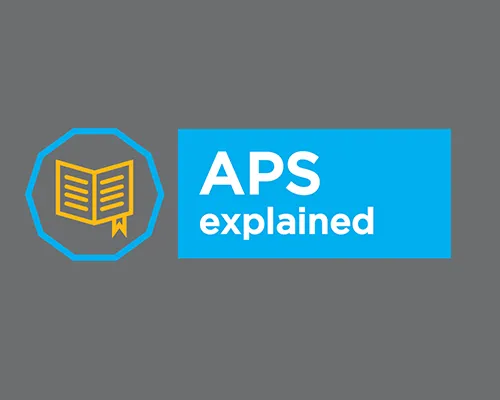Introduction
Why Australians Adore Online Casinos
The vibrant and effervescent spirit of Australians finds a worthy match in the thrilling world of online casinos. A national pastime, gaming is a significant facet of Australian culture, embodying their love for excitement and friendly competition. Among the constellation of gaming sites, Skycrown Casino beams the brightest for Aussie gamblers. It’s an online haven that perfectly syncs with their penchant for high-quality, accessible entertainment.
For an in-depth Skycrown Casino review for Aussies, head over to our colleagues at casinoau10. Discover how Skycrown caters to Australian tastes, offering not just games, but a community where the Aussie gambling spirit thrives unabated
Australians find a sense of camaraderie and convenience in the virtual halls of Skycrown Casino. The platform’s intuitive design, coupled with a vast array of games, mirrors the traditionally social environment of gambling in a digital space. Accessibility plays a critical role, as players can plunge into the thrill of the game from the comfort of their homes, aligning with the modern Aussie’s lifestyle.
This article was written to provide an overview of the APS for parents and students that will be studying in South Africa, particularly from South African IEB and CAPS schools.
Quick Answers/ Table of Contents:
APS Calculations for:
Genius Premium Tuition
We have been supporting students in South Africa since 1993.
In that time, we have taught over 2800 students, helping them get into universities in South Africa and all over the world.
We hope to give you an overview of the APS score and how you can structure your studies to optimise your APS, and therefore improve your chances of getting into your desired degree programme at your desired institution!
What is the APS?
APS stands for Admission Points Score, which is a benchmark score that is used to determine whether you qualify for entry into a particular course or faculty. Many universities in South Africa will only accept your application to a specific faculty if you have the minimum APS requirements for the degree in question.
Why do universities use it?
The APS is calculated because it is a convenient way for universities to process applicants. Given the thousands of applications received yearly, the APS assists with the application process by cutting down on administrative work.
Before applying, potential students know which courses they qualify for and thus do not have to contact the university regarding admission requirements.
The application committee has a regular system for determining whether an individual has met the minimum requirements or not.
How to calculate the APS
Unfortunately, universities vary in their calculation rules – so your APS score for one university will not be the same for your APS score at another.
This is further complicated by the fact that your APS score for one faculty in a university might be different to your APS score in another: this is because most APS scores require you only use your best 6 or 7 best subjects, including subjects required for the relevant course.
For example, if you took History as an extra subject in high school and performed very well in it (and poorly in Physical Science), you will be able to use History in your APS calculation for entry into a BA in place of Physical Science. However, if you are applying for Engineering, you will be required to use Physical Science, since this subject is a requirement for the degree.
Although the universities vary in the way they approach the APS, there are some commonalities:
- Most universities exclude Life Orientation – and the ones that don’t tend to rate it on a separate scale.
- Most universities require you to choose a subset of 6 or 7 of your chosen subjects, and:
- in most cases, these will have to include Mathematics (Maths or Mathematical Literacy) and English (Home Language or First Additional Language).
- the selection will probably have to include course-mandatory subjects (for example, Physical Science for Engineering).
- Most Universities use a 7- or 8-point scale that looks something like this:
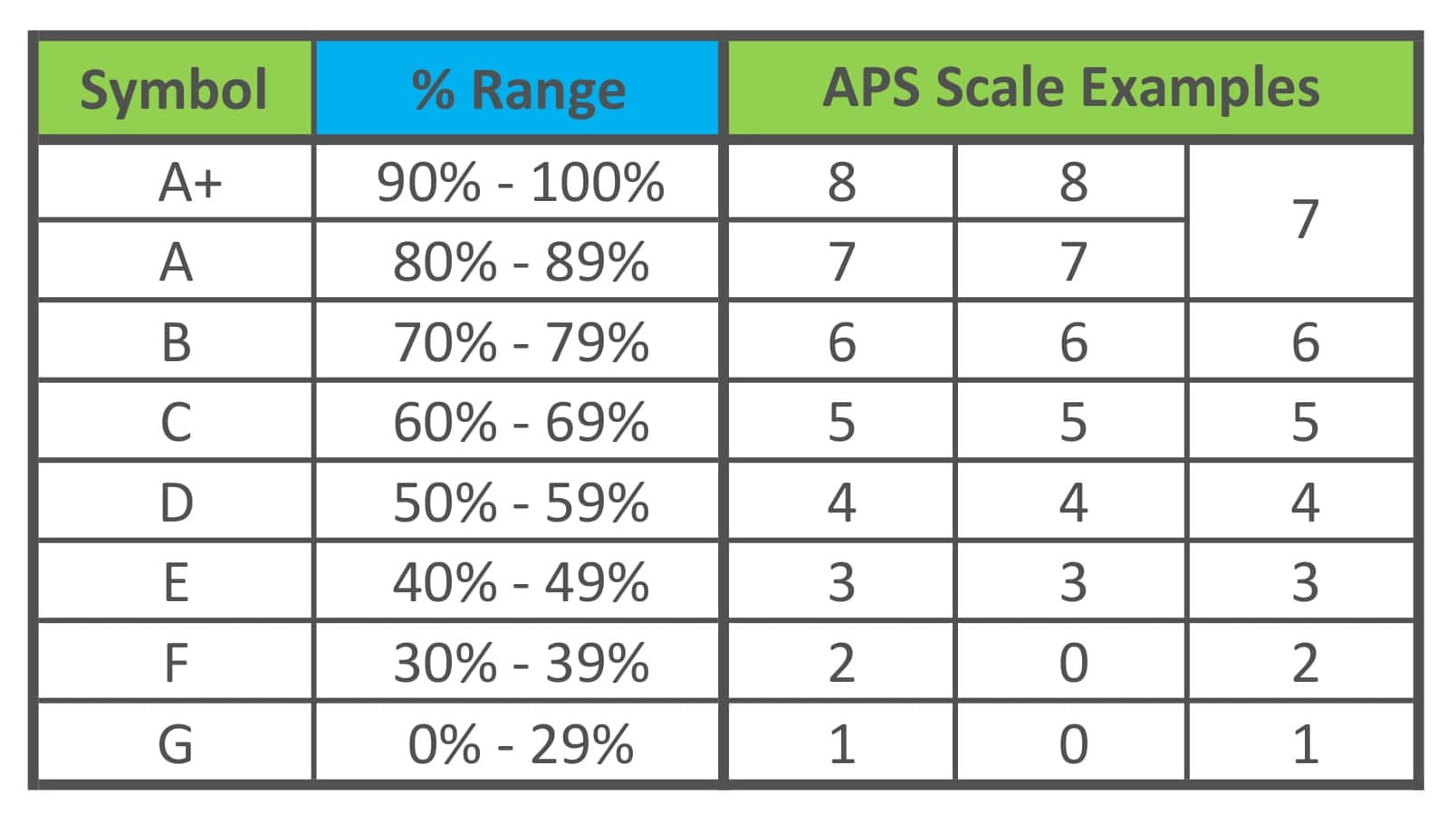
The APS is typically based on your end of Grade 11 results for provisional acceptance, and your final results for final acceptance.
As mentioned earlier, each university has its own version of APS calculation. We provide an overview of APS calculations for some of the best universities in South Africa below, but if the university you are applying for is not on the list then a quick Google search – something like APS score calculation for ‘University Name’ – will quickly get you to that university’s admission requirements and own individual APS calculation.
APS Optimisation
Because of the way some universities calculate their APS scores, it is important to structure your focus and attention to each subject in a way that gets the most APS ‘bang’ for your buck. Here is an example of how a student with a lower matric average can have a much higher APS score for entrance into a Bachelor of Science in Engineering at the University of the Witwatersrand, Johannesburg:
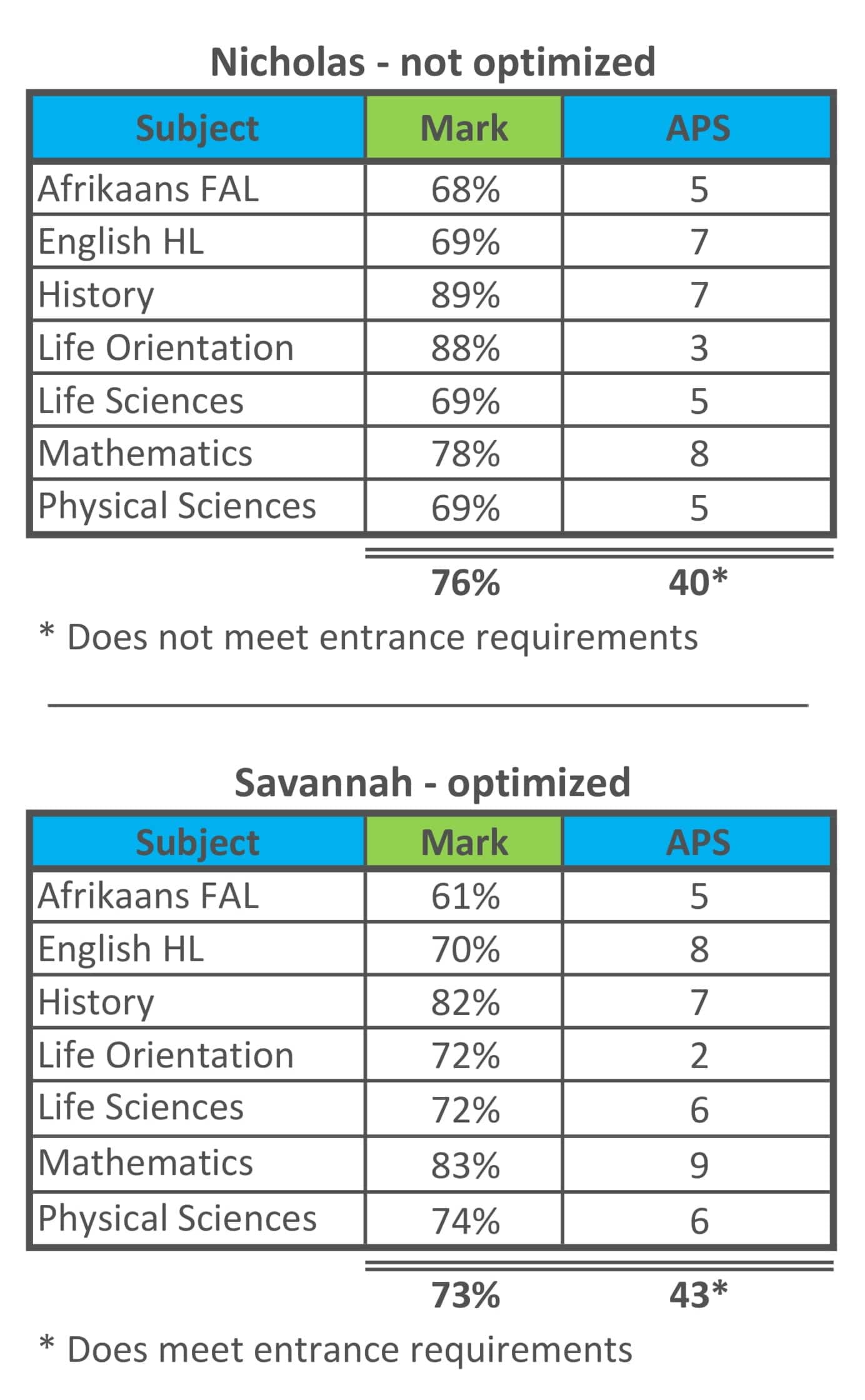
In this example, Savannah spent a lot less time on Afrikaans, History and Life Orientation, and a little more time on English, Life Science, Mathematics and Physical Science – not because they are more important subjects for Engineering (although that is a factor) – but because she was only a few percentage points away from an APS increase in each.
Remember, there is a huge difference in the effort and attention applied between 71% and 78%, but no difference in many universities’ APS results.
When employing an APS optimisation strategy, you need to be exceedingly clear about which universities you are applying to and their APS systems. A good strategy for one university might be a bad strategy for another.
What other entrance requirements are there?
It is important to calculate your APS before applying to universities; however, you should also take into consideration any specific subject requirements listed for the courses offered. For example, some courses require that applicants have achieved 50% and above for certain subjects like English and Mathematics.
In addition to APS and subject-specific requirements, students can also do the National Benchmark Test (NBT), which determines academic readiness for university – a requirement for certain institutions. You should start planning for your NBT towards the end of Grade 11.
APS Optimisation and IEB and CAPs Support
Grade 9 (before you make your subject choice) is a good time to start thinking about all of this. You should tailor your subject choice, and subsequently your study schedule, to match the degree and institution you are aiming for.
That’s where we come in. We identify strong and weak areas, and APS opportunities and threats, in our assessment process. We can also provide guidance on how to work smart to maximise your chances of getting into your desired course.
We then fill in those gaps systematically through premium, one-on-one tuition with our trained in-house team of tutors. This can be done online or in person.
See what our parents have to say.
Why Genius?
Genius has been supplementing the school system and preparing students for South African and international universities for 28 years.
We are not a just tutoring agency; our team of tutors are in-house instructors who have been through a very rigorous vetting and training programme, and we work very closely with them, the school, and your family over the duration of the course to ensure a great result.
Here are some of the things that parents have said about our programme:
- The assessment process is convenient and pain-free.
- The lessons happen at a time that suits you, even if that means mornings or weekends.
- These are one-on-one lessons that happen in your home or online.
- You will improve your APS.
- You will, therefore, have access to a bigger pool of courses and universities to choose from.
- Once your kid gets there, they will be well-positioned to excel academically.
You can book an assessment by heading over to our contact page, or reaching us directly on dean@geniuspremium.com, or +27 11 467 9884.
Need to make a subject choice?
We recommend Hannes Wessels.
Hannes is an educational psychologist in Centurion and Parkhurst (Johannesburg). He strives to help his students live rich and meaningful lives and provides an excellent subject choice assessment that many of our students have benefited from greatly.
University APS Variations
Here is a list of some of the top universities in South Africa and how they vary from the standard APS calculation.
University of Cape Town
Find out more.
UCT has a very different APS system from most universities. Percentages aren’t converted to a score based on their range; they are instead translated to APS scores directly (82% = 82 APS points).
Your 6 best subjects (excluding LO and all AP subjects, and including English HL/ FAL, and any required subjects for the relevant programme) are chosen, their APS points are calculated according to the table below and added to get the APS.
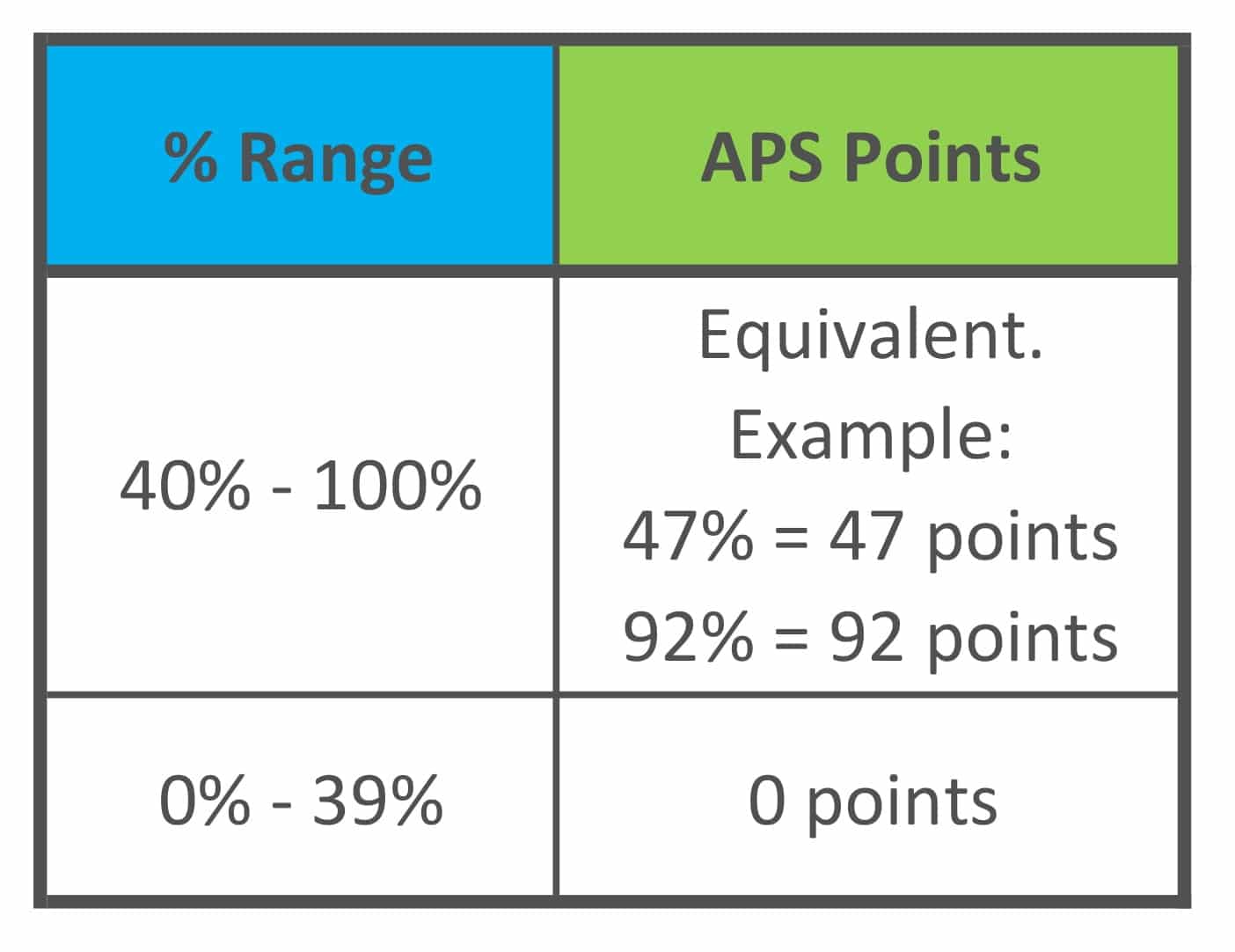
Note: if you are applying to UCT, you should also learn about their Faculty Point Score (FPS), Weighted Points Score (WPS), and Medical Points Score (MPS).
University of Witwatersrand
Find out more.
Wits uses an APS system that biases high marks in Mathematics and English, and does allocate points for LO – although less than for other subjects:
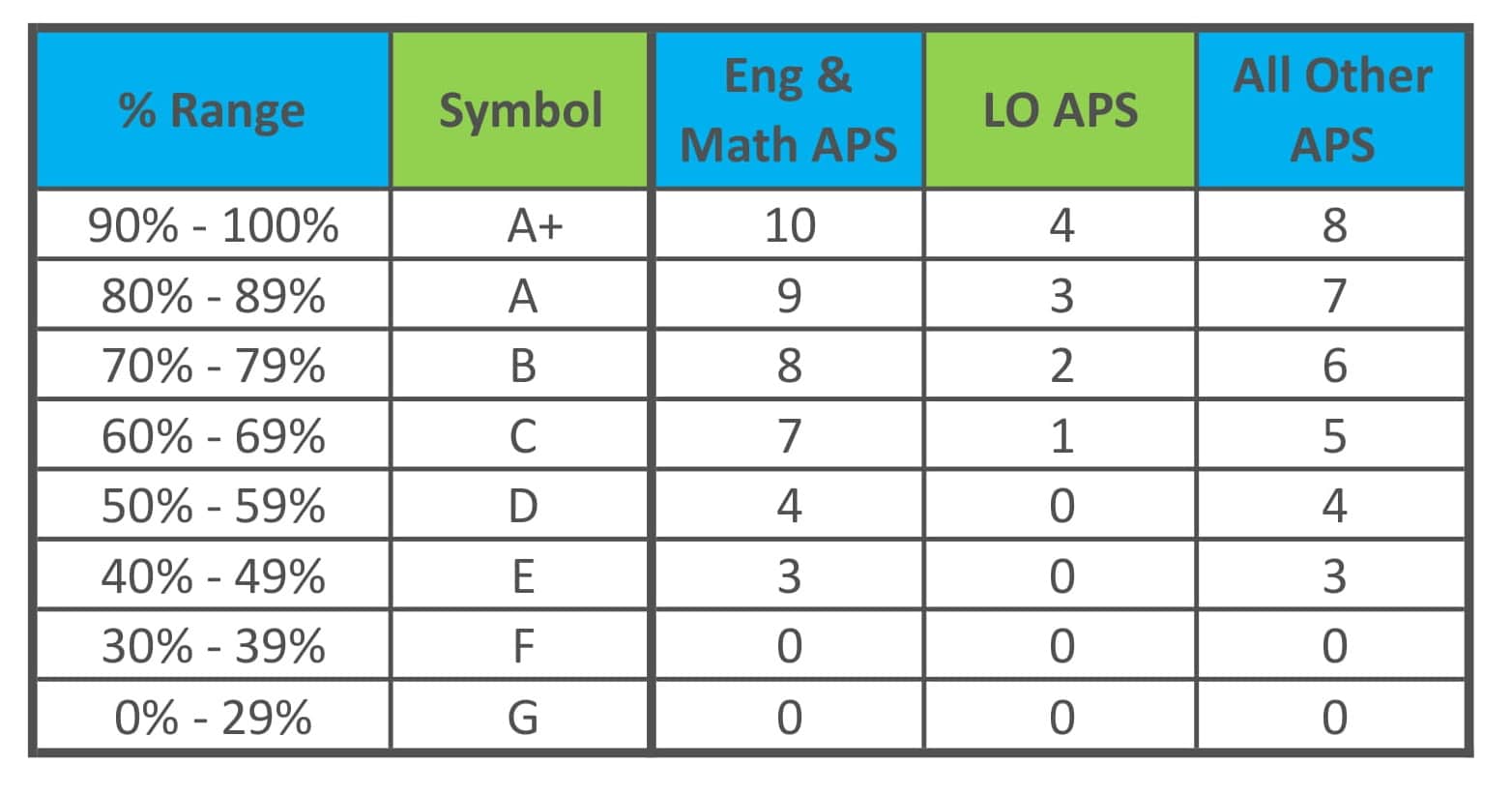
In this system, like UCT, no APS points are awarded for results below 40%
Stellenbosch University
Find out more.
Stellenbosch University does not use the APS system: the specific requirements for your chosen course can be found here.
University of KwaZulu-Natal, and North West University
Find out more: UKZN, or NWU.
Your 6 best subjects are chosen, their APS points are calculated according to the table below and added to get the APS. Note that LO and Mathematics Paper 3 are excluded from the calculation, while English HL or FAL, Math or Math Lit, and any required subjects for the relevant programme must be included.
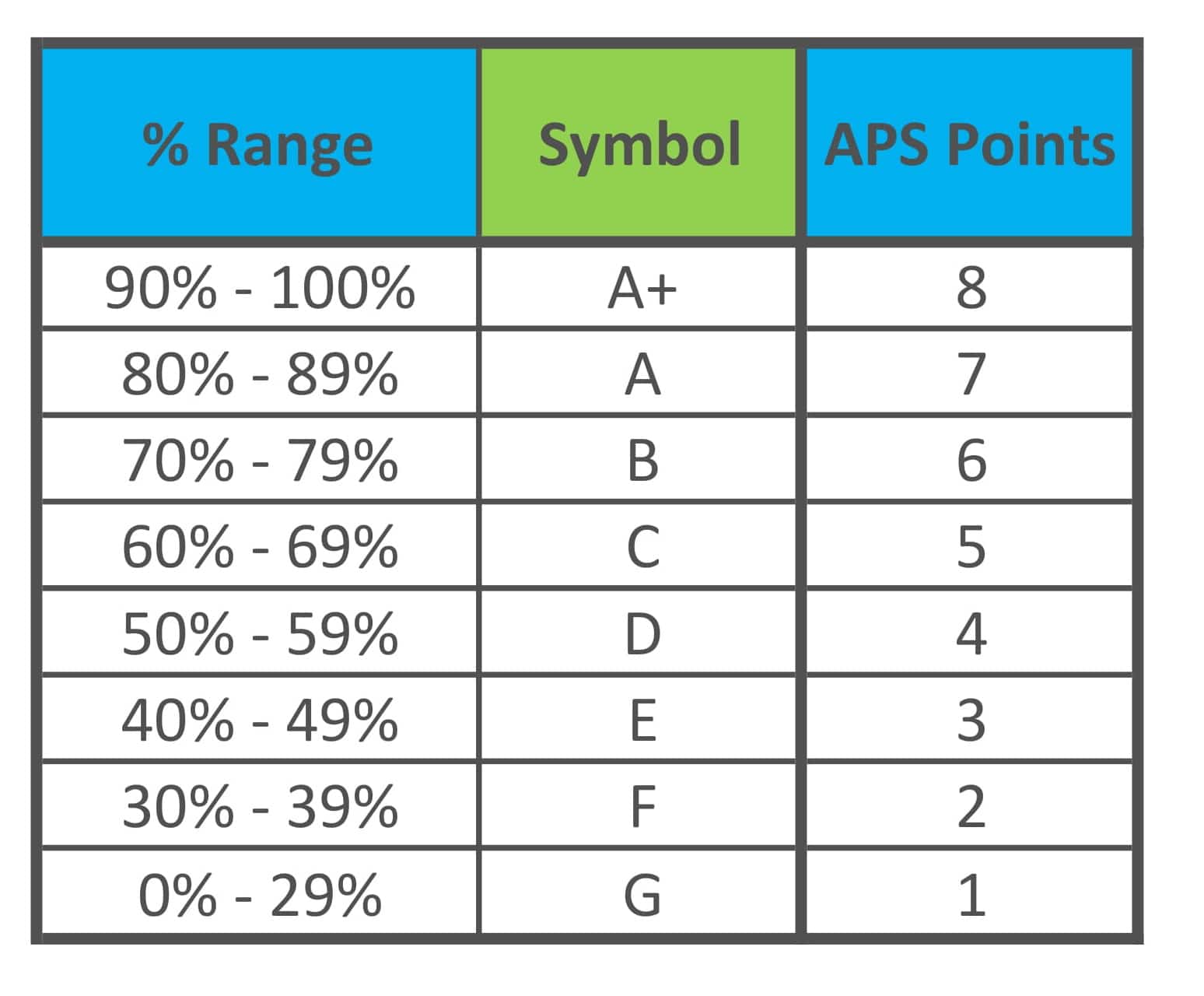
University of Johannesburg, and University of Pretoria
Find out more: UJ, or UP.
Your 6 best subjects (excluding Life Orientation) are chosen; their APS points are calculated according to the table below and added to get the APS.
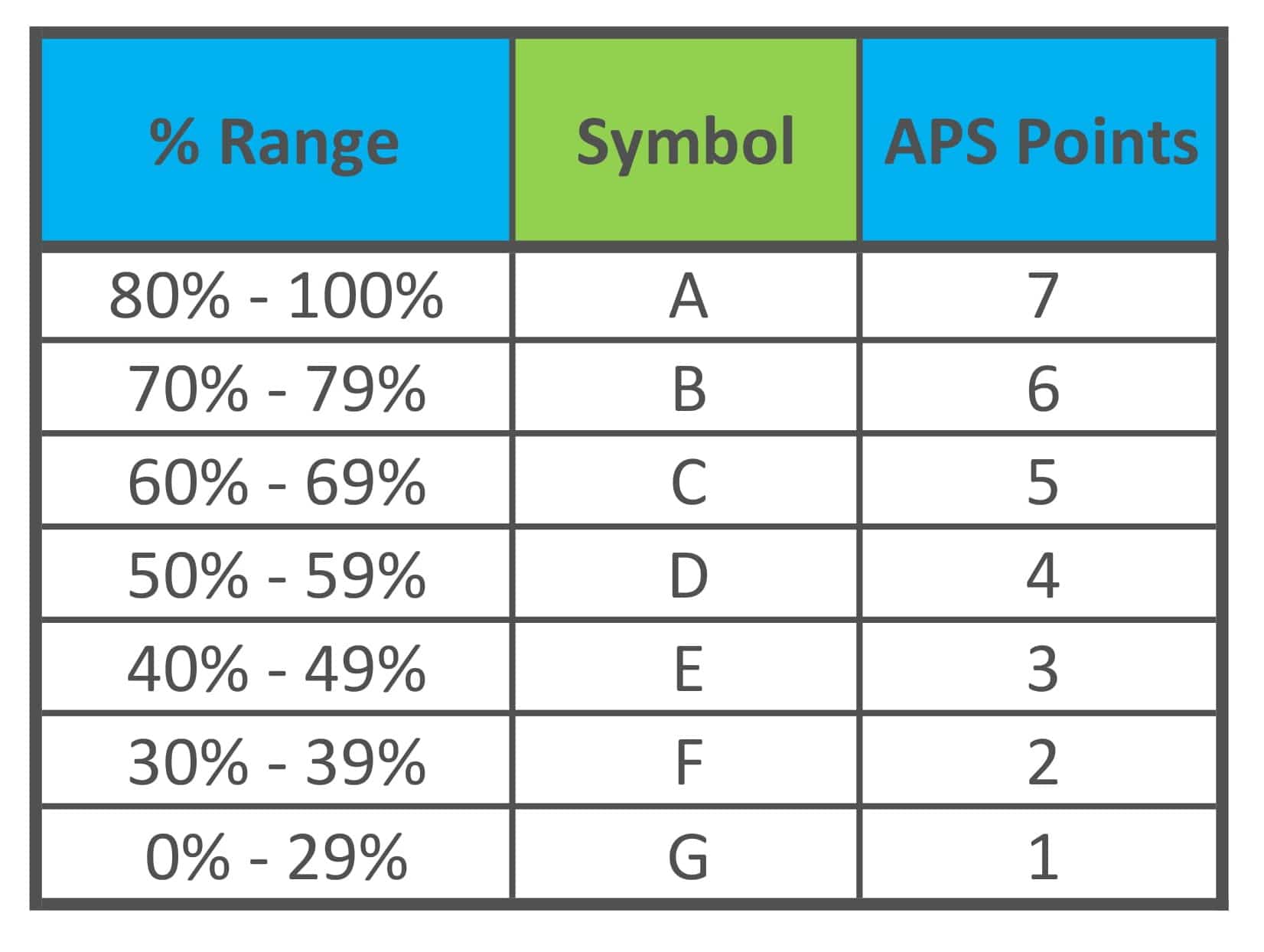
Unlike Wits, UKZN and NWU, an A+ in a subject is not awarded more points than an A.
University of the Western Cape
Find out more.
UWC, like Wits, uses an APS system that biases high marks in Mathematics (literacy or core) and English (HL or FAL), and does allocate points for LO – although less than for other subjects:
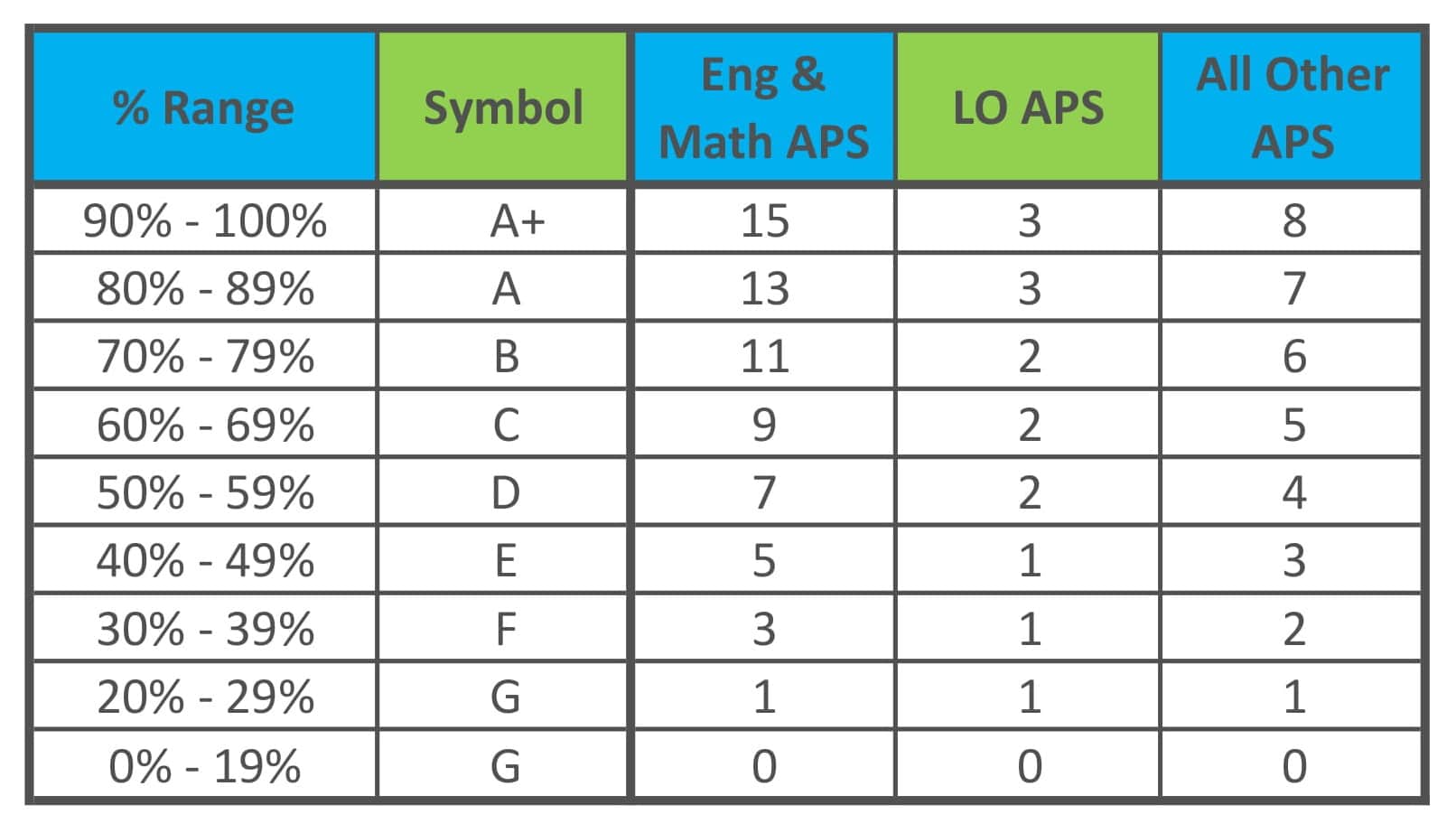
In this system, no APS points are awarded for results below 20%

